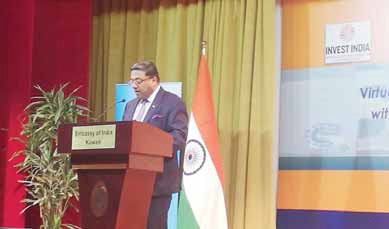26/11/2020
26/11/2020
‘Auto sector key component of Self-Reliant India initiative’
KUWAIT CITY, Nov 26: The Embassy of India in Kuwait, in association with Invest India and the Engineering Exports Promotion Council (EEPC) held a virtual conference on Indian Automobiles with special focus on electric vehicles under the theme Aatmanirbhar Bharat (Self- Reliant India) at the Indian Embassy premises. This conference was the fifth of the series of events which the Indian Business Network (IBN) has set up recently in collaboration with the Commerce Wing of the Embassy.

The event received tremendous response from the business communities of India and Kuwait, like the earlier events which covered all sectors - agriculture and allied sector, pharmaceuticals and textiles. Speaking at today’s event the Indian Ambassador to Kuwait HE Sibi George said the auto sector is a key component of the Self-Reliant Indian initiative - a clarion call given by India’s Prime Minister Narendra Modi.
This initiative, the envoy said, envisages a merger of the local with the global; an idea that ensures India’s strengths as a global force multiplier. The innovative spirit is driving India’s auto sector, which is a pivotal pillar of India’s economy. Toying with the word ‘Ambassador’, he said, he was not talking about a diplomat representing a foreign country in India or representing India abroad. What comes to mind “is our little old iconic Ambassador car.
Today we do not see many Ambassador cars in Indian market. “What we see is a wide range of cars manufactured in India almost every major automobile company in the world. Jaguar to Land Rover, BMW to Benz, Hyundai to Honda, Toyota to Suzuki, Maruti to Ford, Mahindra and Mahindra to Tata Motors, and the little smart Nano, you name it, the list is endless,” he said. This transformation in the automobile industry is an example of the huge transformation that Indian economy has been witnessing in the last few years or decades. “I am told that there are two vintage Indian Ambassador Cars plying in the roads of Kuwait these days. One of the small things that I plan to do one of these days is to organize a car rally of Indian vehicles in Kuwait led by these two Ambassador cars as part of the celebrations to mark the 75th anniversary of India’s independence day and 60th anniversary of establishment of diplomatic relations between India and Kuwait that we celebrate next year,” he added.
He said India’s progress in automobile sector has been rapid. India is currently the world’s largest tractor manufacturer, largest heavy trucks manufacturer, largest two-wheeler and three-wheeler manufacturer, second largest bus manufacturer, third largest heavy truck manufacturer and fourth largest car manufacturer.
With India’s economy projected to remain one of the fastest growing economy for the foreseeable future, especially with the massive infrastructural growth plans to building hundreds of smart cities, build roads, airports, rail lines and ports, rationalize supply chains and warehouse networks, the pace of this growth will only grow further, he disclosed.
India is expected to be the world’s third-largest automotive market in terms of volume by 2026. Auto sector has also been a major recipient of foreign direct investments attracting $24.5 billion FDI during 2000 to 2020. Innovation will also be the key driver towards making India a leader in environment- friendly technology for cars, he said. Laying a roadmap for the future of India’s mobility, Modi has said his vision for the future of mobility in India is based on 7Cs — common, connected, convenient, congestion free, charged, clean, cutting edge.
The Indian premier has also said India wants to drive investments across the value chain from batteries to smart charging to electric vehicle manufacturing. India’s entrepreneurs and manufacturers are now poised to develop and deploy break-through battery technology, he added.
Development of the Electric Vehicles segment is a key priority for the Indian government as it complements India’s investments and commitment towards renewable energy. “It is part of our commitment to our heritage, our fight against climate change and our gift to the future generations. This strong commitment coupled by requisite policy initiatives by our government has resulted in electric vehicles segment witnessing tremendous growth in India,” said the Indian envoy.
Speaking of the relationship between India and Kuwait he called them historical and age old. “Our close bilateral relations are strongly anchored in civilizational linkages and nurtured by vibrant people-to-people contacts. And, trade/commerce has been an important pillar of this multifaceted relationship; India has consistently been among the top trading partners of Kuwait. Indian brands like Tata Motors, Ashok Leyland, Maruti, Mahindra, and so on, are well known and the exceptional quality of Indian products are well acknowledged not only in the Kuwaiti market but also across the globe,” said Ambassador George. He added, the Covid-19 pandemic has been a major global disruptor of health, human lives, livelihoods and economies; and whilst humanity as a whole continues to grapple with this challenge of unprecedented proportions, it is important to remember that crisis situations often bring about the best in people.
By Paul Francis X. Fernandes Arab Times Staff


